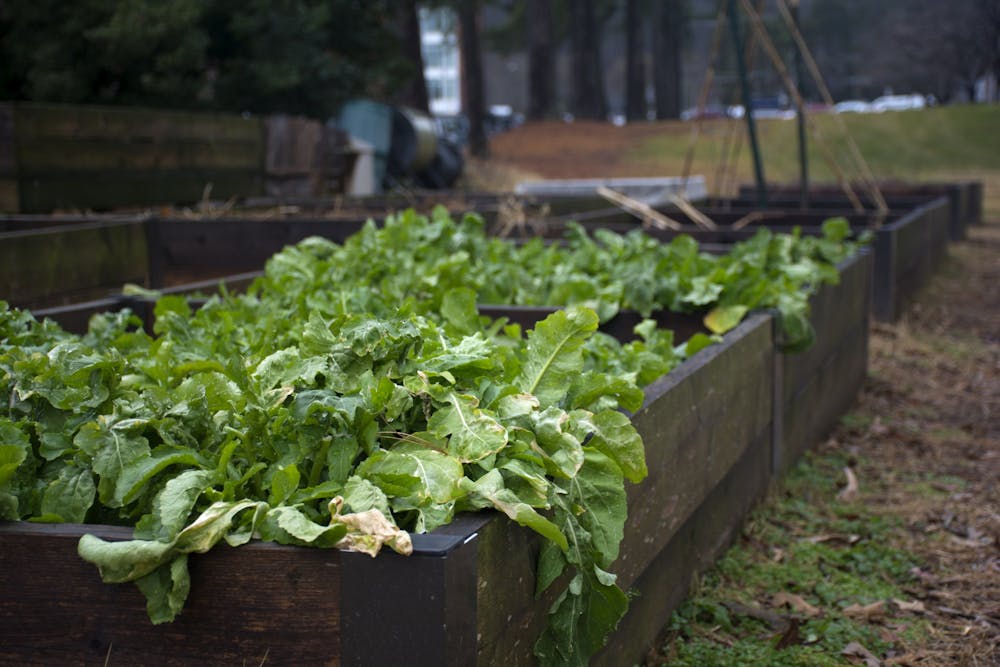As part of the University’s Community MLK Celebration, U.Va. Lifetime Learning is partnering with Morven Farm to present the online panel entitled Food and Justice in Virginia. The event aims to get listeners to become active participants in the local food system by engaging in dialogue surrounding food’s connection to racial justice.
The panel, which will take place Wednesday, features Christianne Queiroz, program director of Virginia Farm Workers; Dr. Basil Gooden, former Virginia Secretary of Agriculture and Forestry; Tanya Denckla Cobb, director of the Institute for Engagement and Negotiation; and Shantell Bingham, program director of Charlottesville Food Justice Network.
Paul Freedman, politics associate professor and moderator of the upcoming panel, sits on the Board of Directors for Cultivate Charlottesville, a Charlottesville-based organization that “aims to empower individuals to create a healthy and equitable food system.”
Freedman also teaches a course entitled Politics of Food that highlights inequalities in the modern food system, from enslaved laborers peeling shrimp in Thailand to food deserts in the United States. The course also acquaints students with local initiatives spearheading reform in Charlottesville.
“Ultimately, food justice refers to how we treat people in the food system, and that includes people who are eaters as well as people who are producers.” Freedman said.
For Freedman, the Charlottesville food system presents a striking dichotomy. On one hand, the city boasts a thriving scene of restaurateurs and wineries. However, the Charlottesville community is also grappling with heightened food insecurity — while Virginia’s rate of food insecurity is estimated to sit around 11.9 percent, Charlottesville faces a rate of 17.5 percent. Additionally food insecurity is a direct consequence of poverty, a reality which marginalized groups are more likely to experience.
“The bounty we enjoy is not equally and evenly and equitably distributed,” Freedman said. “Racial and ethnic minorities are far more likely to be living in poverty, to be living in conditions of food insecurity, particularly in [single] women-headed households with children.”
Freedman explained that food justice is inseparable from racial justice. Slavery and the United States’ history of racial inequality are intertwined with its agricultrual history.
Historically, land has been stolen from Black and Indigenous farmers, and workers in fields and meatpacking plants are disproportionately people of color, with over 56 percent of “animal slaughtering and processing workers” in the U.S. being Black or Latinx.
To combat these inequalities, Freedman suggests that consumers ask questions about their food sources, such as “where is my food coming from?” and “how were the workers who produced this food treated?” At its core, Freedman argues, these questions are political.
“Most of us engage with the food system, several times a day,” Freedman said “We make choices that reflect these [political] questions. Every bite of every burger, every burrito, every bagel … is in some tiny little way a political act.”
Like Freedman, Gooden recognizes the disadvantages that marginalized groups face when it comes to food security.
“Minorities earn less money, which reduces the availability of good healthy food … [and] health is directly impacted by good nutritious food,” Gooden said. “When you're left out of leadership roles to really point to some of these disparities in the food system or the health system, a lot of times these issues go unaddressed.”
Gooden indicated that fortunately in Virginia, several women and minorities hold powerful positions in the field of agriculture, including Commissioner of the Virginia Department of Agriculture and Consumer Services and the Commonwealth’s Secretary of Agriculture. However, on the whole our nation lacks diversity in the agricultural industry.
“We're not here to point fingers, place blame, but there is an issue with the lack of representation among women and minorities,” Gooden said. “Governments have a role in actually diversifying, ensuring that you get a good mix of leadership in the sectors that touch agriculture.”
Bingham’s work with Cultivate Charlottesville’s Food Justice Network approaches racial equity in the local food system. She entered the food justice scene while still a University student after she received a grant to found Growing for Change, a program which collaborates with low-wealth neighborhoods to establish community gardens.
Bingham suggests that there are a variety of ways that one can get involved in the food justice movement in the local community. She recommends engaging with these issues by educating oneself about the varying perspectives involved, specifically those of minorities.
“To understand [food justice] from the perspective of a Black leader or a Brown leader, and folks that have really kind of been carrying this torch for a really long time, I always recommend reading ‘Freedom Farmers’ by Monica White, and ‘Farming While Black’ by Leah Penniman,” Bingham said.
Bingham also advocates for volunteering to weed and help grow food in community gardens. She believes that gardens hold the power to transform underserved communities by changing the way that these neighborhoods are perceived.
“The beauty of just growing a garden is that first of all … people are actively seeing the vitality of a place,” Bingham said. “Instantly when you start growing in communities, folks kind of start looking at them very differently.”
The panelists will discuss these three issues — equitable food access, historical harm toward farmers from marginalized communities and protecting the health of food service workers — at 2 p.m. on Wednesday.
To register for the panel, visit the Eventbrite sign up.







